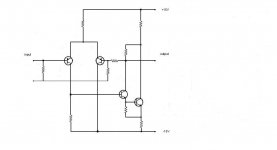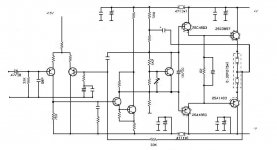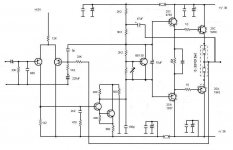Go simulate and look what it does (or what it does not). 😉GEirin said:Opinions?
- Klaus
Hi KSTR.
Thanks you very much for you reply and help. I not an expert in amplifier, audio is my hobby.
regards
Guillermo
Thanks you very much for you reply and help. I not an expert in amplifier, audio is my hobby.
regards
Guillermo
Hi Guillermo,
no soy un experto tampoco...
A problem with the Kulish stage (as far as I found in my little investigation so far) is that it seems to need a high supply voltage, at least if one wants to make use of the most linear part of the transfer function which is at the lower end of output voltage (see my post in LXG's Kulish thread). This might complicate its use as a VAS, like in your first ciruit.
While in general these ideas look promising one still needs to elaborate on them in depth to see if the advantages really win over the disadvantages...
Klaus
no soy un experto tampoco...

A problem with the Kulish stage (as far as I found in my little investigation so far) is that it seems to need a high supply voltage, at least if one wants to make use of the most linear part of the transfer function which is at the lower end of output voltage (see my post in LXG's Kulish thread). This might complicate its use as a VAS, like in your first ciruit.
While in general these ideas look promising one still needs to elaborate on them in depth to see if the advantages really win over the disadvantages...
Klaus
Ok. Klaus.
¿Tu hablas español?.
Muchas gracias y espero tu simulación.
Yes advantages vs. disadvantages.
Guillermo.
¿Tu hablas español?.
Muchas gracias y espero tu simulación.
Yes advantages vs. disadvantages.
Guillermo.
It has certain advantages if your topology allows you to keep the inner collector swings limited, and keep both transistors comfortably biased in a linear region with a reasonable amount of Vce (more than a few volts). For a classic VAS, with large collector rail-to-rail voltage swings, this can be difficult, unless a additional pair of higher voltage rails are employed. My suggestion is to leave the VAS as a single-ended or cascoded BJT, and think about an LTP instead.
I haven't looked at the LTP biasing in detail yet. It should be possible to develop a Kulish LTP that is in effect a JFET replacement, and even more linear and more flexible wrt to transconductance adjustments, etc.
I haven't looked at the LTP biasing in detail yet. It should be possible to develop a Kulish LTP that is in effect a JFET replacement, and even more linear and more flexible wrt to transconductance adjustments, etc.
Hi Guillermo,
Did you ever build your last design?
That was a nice amp, you should build and listen to it, it will definitely surprise you.....
I mention this because you are falling into the same trap which gets me every time; moving from one idea to the next without fully investigating the last (good) idea......
Cheers,
Hugh
Did you ever build your last design?
That was a nice amp, you should build and listen to it, it will definitely surprise you.....
I mention this because you are falling into the same trap which gets me every time; moving from one idea to the next without fully investigating the last (good) idea......
Cheers,
Hugh
KSTR said:tampoco
Klaus,
sin embargo, un "Kraut" listo con humor es buena lectura.
(como la idea fresca de un servo en Class A, por ejemplo)
Mr Dean,
best NY's wishes to the Victorians who are speeding 10 hours ahead to the calendar change.
Hi all.
Thanks for your replies.
Linuxguru. OK. Thanks for you explanation. You would try this idea?
Hugh, hello. I´m more curious, to explore new ideas. I build no my design because i have no time. Thank for you suggestions.
Jacco; you not an expert in amplifiers? Buen humor.
Happy new year 2008.
regards
Guillermo
Thanks for your replies.
Linuxguru. OK. Thanks for you explanation. You would try this idea?
Hugh, hello. I´m more curious, to explore new ideas. I build no my design because i have no time. Thank for you suggestions.
Jacco; you not an expert in amplifiers? Buen humor.
Happy new year 2008.
regards
Guillermo
GEirin said:expert
Nope, but when i'm not chasing windmills i am Don Ladron de la Mente. beep
Enjoy the last of la vieja senora and prospero ano nuevo to you too, Guillermo.
Well, I used to speak and write spanish quite well... not anymore, I have to say (need a dictionary for every sentence). I spent almost two years or so living in Spain (Salamanca/Madrid), in the early nineties.GEirin said:Ok. Klaus.
¿Tu hablas español?.
I'm sure Jacco will beat me easily in any real world situation...
Hugh makes a good point... as I suffer from this phenomenon, too. Common availibility of simulation tools makes this even more dangerous -- new day, new set of ideas which "have to tried first before making a final decision" (repeat ad nauseum).
Saludos, Klaus
- Status
- Not open for further replies.
- Home
- Amplifiers
- Solid State
- Kulish Corrector applications


